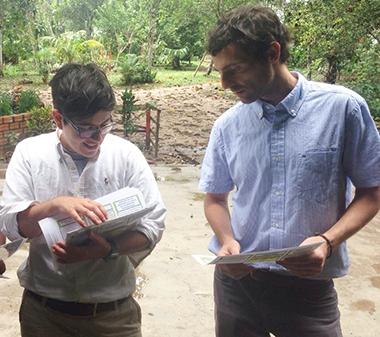SPH Professor Finds People in Peru Are Being Exposed to Dangerous Levels of Mercury
 |
|
Beth Feingold, left, and Duke University research colleague Axel Berky, in Madre de Dios, Peru, where they and other colleagues researched the mercury exposure of residents.
|
ALBANY, N.Y. (Dec. 19, 2019) – People living in the southern Peruvian Amazon are being exposed to potentially dangerous levels of mercury due to a combination of their diet and artisanal and small-scale gold mining occurring in their communities, a School of Public Health researcher found.
Mercury has long been known to be concentrated in fish and pose health risks, such as neurological challenges, if an excessive amount is consumed. This concern is especially pertinent for women of childbearing age, children and for those living in cultures where fish comprises a large amount of the diet.
The risk is even greater, explains Beth Feingold, an assistant professor of Environmental Health Sciences, for people living near communities where artisanal and small-scale gold mining occurs. According to the Environmental Protection Agency, artisanal and small-scale gold mining produces about 20 percent of the world’s gold – and the practice is the largest source of mercury emissions globally, higher even than coal combustion.
“Artisanal and small-scale mining is not subject to the same government oversight that larger-scale mining is, and as a result is often associated with the release of mercury into the environment and other detrimental impacts on the local environment,” said Feingold.
To determine what effect this type of mining could have on nearby residents’ mercury exposure, Feingold and colleagues conducted the first assessment of mercury exposure in a population-based sample in Madre de Dios, a significant artisanal and small scale gold mining region in the southern Peruvian Amazon where she and her colleagues has previously demonstrated environmental mercury contamination. In their recent study now in press in Environmental Research, hair samples were collected from 723 participants from 46 communities and household surveys were completed to assess fish consumption.
They looked to identify factors associated with elevated mercury levels and compared whether the relationship between fish consumption and total mercury in hair – a proxy for recent dietary mercury exposure – was different among people living within and outside of watersheds where artisanal and small-scale gold mining occurs.
Findings indicated that more than 37 percent of the population of Madre de Dios, including nearly 43 percent of women of childbearing age and 20 percent of children under 5, had hair mercury levels exceeding the levels that the World Health Organization deems safe. In addition, results suggested that excessive consumption of carnivorous fish is only associated with higher hair total mercury in persons residing in watersheds affected by artisanal and small-scale gold mining affected areas, not in those living in other areas.
Feingold notes that the results merit increased screening for mercury levels. “Monitoring children and women of childbearing age for elevated mercury levels could help assess potential long-term health impacts of chronic mercury exposure,” said Feingold.
![]() For more news, subscribe to UAlbany's RSS headline feeds
For more news, subscribe to UAlbany's RSS headline feeds
A comprehensive public research university, the University at Albany-SUNY offers more than 120 undergraduate majors and minors and 125 master's, doctoral and graduate certificate programs. UAlbany is a leader among all New York State colleges and universities in such diverse fields as atmospheric and environmental sciences, business, education, public health,health sciences, criminal justice, emergency preparedness, engineering and applied sciences, informatics, public administration, social welfare and sociology, taught by an extensive roster of faculty experts. It also offers expanded academic and research opportunities for students through an affiliation with Albany Law School. With a curriculum enhanced by 600 study-abroad opportunities, UAlbany launches great careers.


